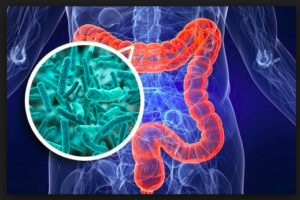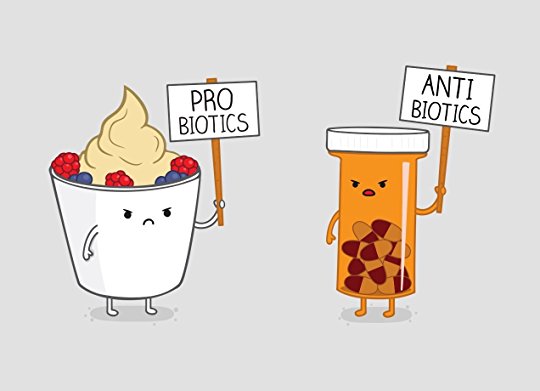Much like a thriving rainforest, the human gut is a rich ecosystem mirroring the ecological balance found in common environments such as the Amazon. These ecosystems within our guts are often referred to as intestinal microbiomes and play a huge role in how certain illnesses manifest right from our early infant stages and throughout the rest of our lives.

Now, a lot of microbes are linked to disease and not to health. Truth is there are a lot of non-harmful microbes alongside the ones that cause illnesses such as chronic diarrhoea.

Antibiotics have commonly been the first option in combating these harmful microbes but now researchers are becoming increasingly troubled by the heavy reliance on these antibiotics.
Some and indeed many microbes in our microbiomes are harmless and even beneficial.
Consider a common bacteria such as E.coli which actually has a commensalic association with us meaning it derives nutrients and shelter from us but its presence is not harmful. Its balance in our gut is what's important.
Take a moment to think about this;
Babies acquire around 100 microbe species as they pass through the birth canal. They are then exposed to more microbes from the mother's skin after birth. Then add microbes from contact with doctors, nurses, a very proud father, excited relatives and perhaps even the family pet at home. By the sixth month of this baby's life, about 700 species of microbes are present on the baby. At age 3, the child has a microbial community that's as unique as his or her fingerprint.
In the case of premature infants delivered through a C-section, perhaps owing to difficulty in normal birth or risk of the mother infecting the baby, these infants enter the world with a clean microbiome slate. They are then put on antibiotics right away to avert the risk of disease. The antibiotics have the effect of upsetting the balance of microbial life within the infant preventing beneficial bacterial communities from forming.
The thing is it's very important for the niches within the gut to be taken up as quickly as possible as this makes it difficult for pathogens to get a hold and actually cause infections.
The use of antibiotics is equivalent to dropping a bomb on a microbial community in the hope that only the harmful bacteria will be in annihilated leaving only the healthy bacteria. All you end up with is a lot of collateral damage.
We simply have to manage the microbes instead of dropping all sorts of "antibiotic bombs" on our microbiomes.
This can be done using probiotics which are microorganisms which when administered in adequate amounts transfer a health benefit to the host. Probiotics are currently commonly sold as food supplements and are promoted as "magic pills" that can improve immunity.
However, if you're skeptical about these supplements, you could try more natural sources of probiotics with the most common being yogurt. Other sources include pickles, Sauerkraut and Kimchi (fermented salted cabbage).

A case study was done in which antibiotics were replaced by a form of treatment involving fecal transplantation. I know it sounds icky but bear with me.
A team led by University of Minnesota immunologist and gastroenterologist Alexander Khoruts dealt with a patient who suffered a Clostridium difficile infection which is life threatening. The woman suffered chronic diarrhoea and had lost 60 pounds (about 27kg) in 8 months.
In a last resort effort to save her, Khoruts and his team took a sample of stool from the woman's husband, mixed it with a saline solution and injected it into woman's intestine. Within 24 hours the diarrhoea had ceased and a few days later the symptoms were all gone.
While looking at the patient's progress, Khoruts was surprised that there was almost a 100% replacement of the woman's microbial flora with that of her husband.
Since the initial patient, another 23 patients have all undergone the same treatment with amazing results.
So, essentially, start taking care of your gut germs inorder to take care of the rest of you. Over-reliance on antibiotics could prove costly to your health in the long run.
Congratulations @nick2705! You have completed some achievement on Steemit and have been rewarded with new badge(s) :
Click on any badge to view your own Board of Honor on SteemitBoard.
For more information about SteemitBoard, click here
If you no longer want to receive notifications, reply to this comment with the word
STOPDownvoting a post can decrease pending rewards and make it less visible. Common reasons:
Submit
Upvoted on behalf of @thehumanbot and it's allies. Write less but write great original content, which is the key to success in Steemit. If you are using any image or video, cite proper source. Even if its your own image or video, it's worth mention the same. Also be careful to avoid duplicate posting.
Great Original Works are rewarded by top Curators, refer posts from my Step-Brother @humanbot for more details.If you like this initiative, you can follow me in SteemAuto and upvote the posts, that I upvote.
And remember to do some charity when you are rich by contributing to me. Check out my Introduction Post for more details. If you have any concerns or feedback with my way of operation, raise it with @sanmi , my operator who is freaking in Steemit chat most of the time.
Downvoting a post can decrease pending rewards and make it less visible. Common reasons:
Submit
Thanks so much for the advice 😃.
I'll be sure to cite my sources next time I post.
Downvoting a post can decrease pending rewards and make it less visible. Common reasons:
Submit